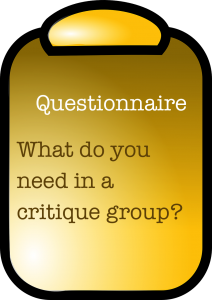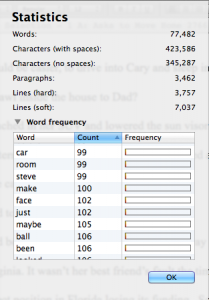“The process of critiquing other writers’ work thoughtfully and intelligently will help you strengthen your own writing.” — Melissa Donovan
Critiquing is valuable to success…unless you find yourself in the wrong critique group.
Use the following questionnaire to:
- Revamp your floundering group
- Start a new compatible group
- Join the right existing group
Questionnaire
- What help do you need? Be honest. Don’t leave off tasks because you want to avoid criticism of your weak areas. Possible tasks are:
- Punctuation, spelling, & grammar
- Word choices
- Paragraph & sentence construction
- Plot & characters
- Scene goals & hooks
- Conflict & believability
- Prayer
- What’s the feedback style you’re willing to give and receive? Some are:
- Frank honesty (“This paragraph is too melodramatic.”)
- Soft honesty (“You may want to tone down this paragraph.”)
- High on encouragement; low on criticism (“I like this word choice.”)
- Combination (“This paragraph is too melodramatic. You may want to tone down what Mark says to Melanie. I like your use of ‘grandiose’ in the last sentence.”)
- How much time are you willing to spend critiquing a chapter? If group members commit to more than the first two tasks under Question 1, you may spend two or more hours on a chapter. Also, the levels of writing ability will determine how much needs to be addressed.
- How many critique partners can you realistically handle? And:
° progress your own manuscript
° perform an effective job on others’ chapters
In a 6-member group, depending on tasks chosen in Question 1, you could spend 6 to 18 hours a week critiquing.
In a past large group, some marked punctuation, spelling, and grammar only, while others performed in-depth critiques. Another member and I split off to form a 2-member group of frank, in-depth partners. That worked better for us.
Maybe it’s time to break your large critique group into smaller groups.
- What rules do you expect so the group functions fairly? No one wants to feel imposed upon by members not pulling their load. Rules might address:
- Number of critiques performed to earn a critique
- Expected tasks to be performed (Question 1)
- Style of feedback (Question 4)
- What mix of writing-skill levels do you desire? Writers who:
- are writing their first book
- have completed a novel
- have submitted for publication at least two books
- have one or more published novels
Writers are readers, so all levels can add value.
- What craft development do you expect from members? A group may fail if some are learning the writing craft and others aren’t.
Activities members could choose from:
- Attend writing workshops
- Join local and online writing groups
- Read craft books from a recommended list
- Take online courses
- Subscribe to writing blogs
8. How important is it to critique in your genre?
In one group, a woman wrote Regency. Not having read Regency, I was ill-equipped to critique her work in some aspects. In another group, we had to, at least, read Amish novels. I read them and could give all-around feedback.
Join the right critique group, revamp a failing one, or start an effective one. Click to tweet.
What’s most important to you in a critique group?















 RSS - Posts
RSS - Posts